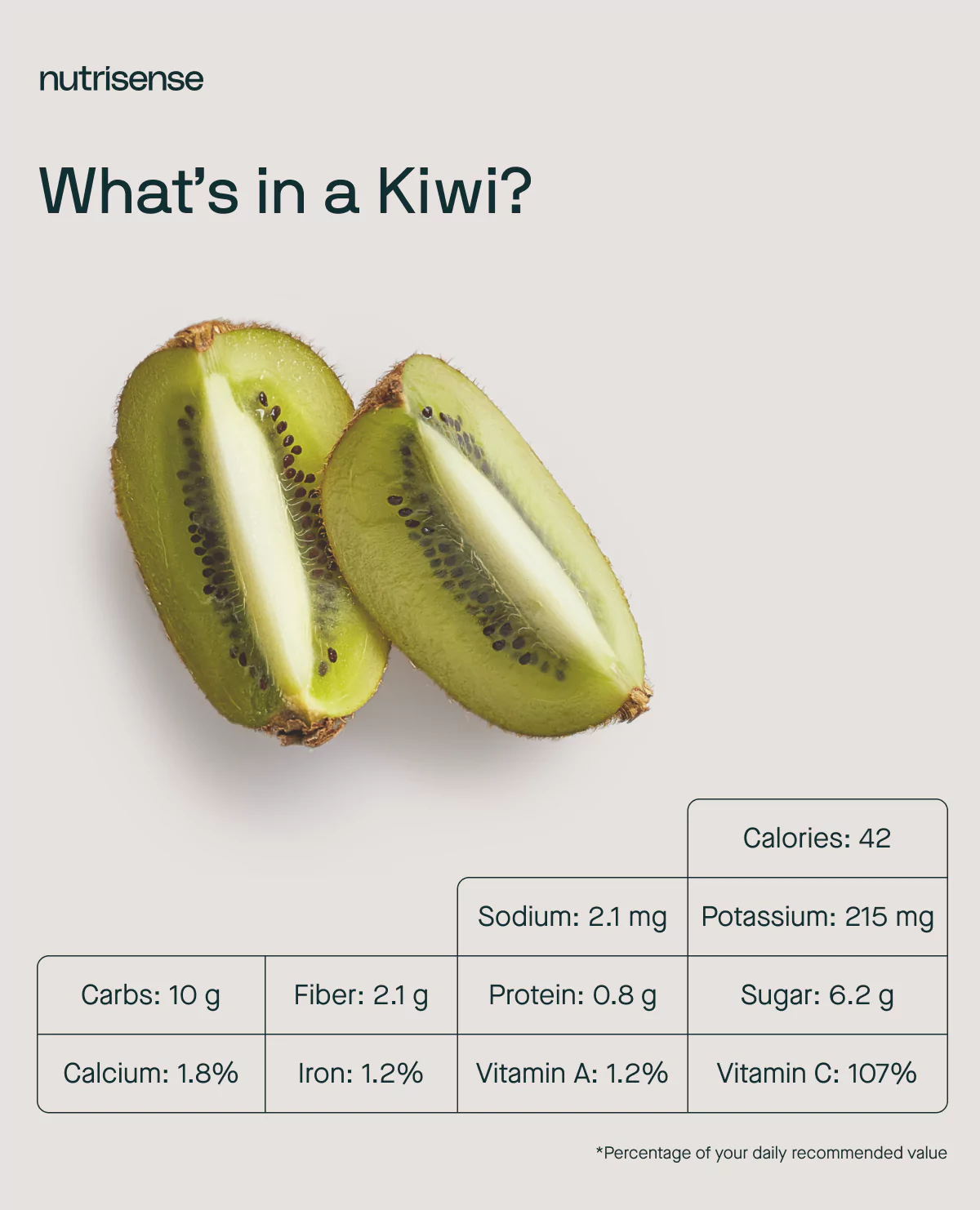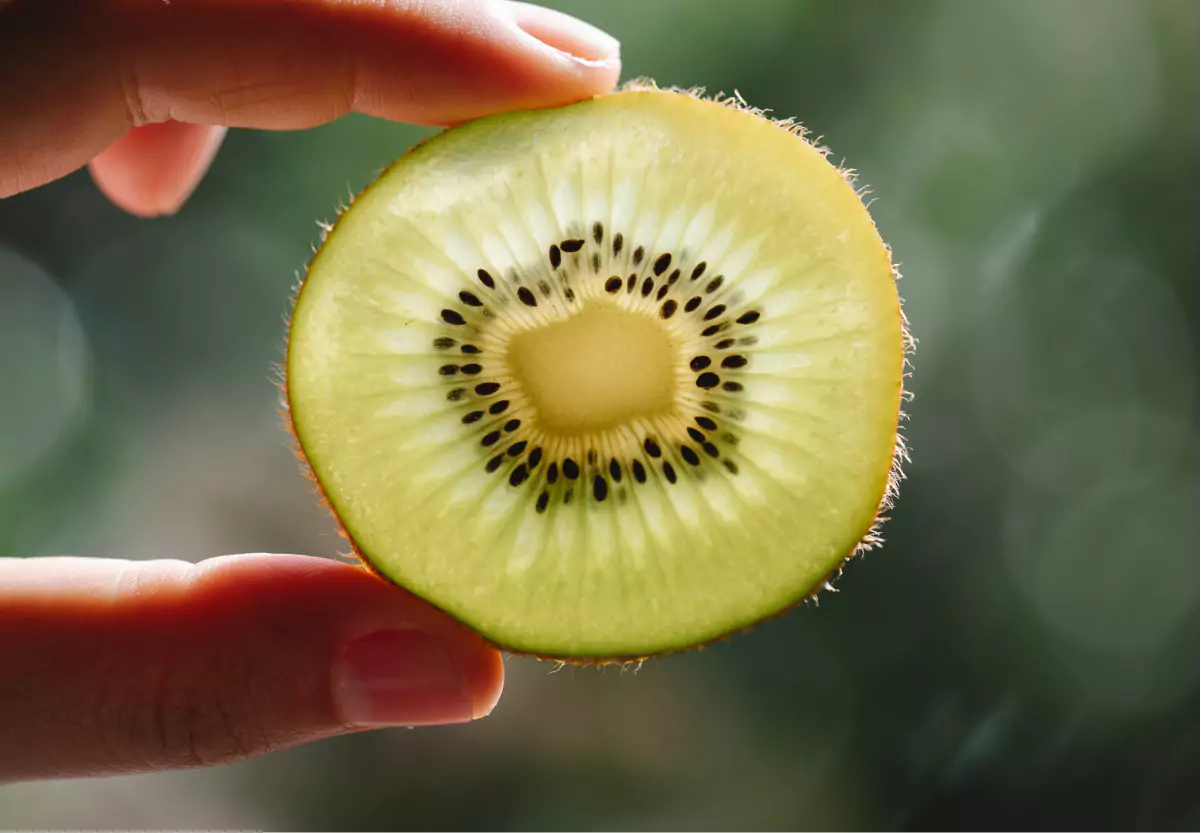10 Benefits of Kiwi Fruit: A Superfood for Your Health

Key Takeaways
Did you know that kiwi has almost three times the amount of vitamin C as oranges?
As we saw in our recent article on immune-boosting foods, there are a number of fruits that are high in nutrients that can be beneficial for immune health.
But one superfood fruit in particular has a host of health benefits that can be especially beneficial this time of year: kiwi!
Want to learn why you should be adding more kiwi to your plate this winter? Keep reading for 10 interesting benefits of kiwi fruit and some tips for including it in your diet.
Kiwi Nutrition Facts
Kiwi is a nutrient-dense fruit that can be a good source of dietary fiber, is low-calorie, and is known for its high vitamin C content. But that’s not all: kiwi also contains nutrients like magnesium, potassium, vitamin A, vitamin C, vitamin E, and vitamin K.
Let’s take a look at the full breakdown of the macro and micronutrients present in this fruit. One raw kiwi contains:

10 Health Benefits of Kiwi Fruit
So, why should you stock up on kiwi fruit? Here are 10 reasons you may want to make a habit out of snacking on kiwi.
1) Full of Important Nutrients

In addition to their delicious, sweet taste, kiwis are full of micronutrients such as copper, potassium, vitamin C, and folate.
Copper helps support connective tissue and healthy collagen production. Potassium plays a crucial role in the fluid balance of cells and is also important for blood pressure regulation.
Kiwi fruit also contains an extremely high amount of vitamin C, which can support the immune system and also functions as an important antioxidant in the body.
2) Shown to Benefit Sleep Quality
Eating kiwi may also improve your sleep quality. One interesting study found that consuming kiwis for four weeks led to higher quality sleep in adults who had sleeping problems.
Sleep quality is very important for your mood, weight regulation, and many other aspects of health. Your diet can have a major impact on your sleep in many ways.
3) Kiwi Seeds Contain Essential Fatty Acids
The black seeds found inside kiwis also contain small amounts of some healthy fats, specifically polyunsaturated and monounsaturated fats.
Though some have suggested that kiwis are a good source of omega 3 fatty acids, this may not be entirely true. Kiwis actually contain alpha-linolenic acid (ALA), which is a precursor fatty acid to the “active” omega 3 fats, DHA and EPA.
Only a very small percentage of ALA will be converted to EPA and DHA in the human body, so while kiwis may contain some small amounts of ALA, they are not a good source of EPA or DHA.
4) May Improve Digestive Health
One kiwi contains more than two grams of fiber, which is essential for a healthy digestive system. Scientists that have analyzed the type of fiber in kiwi found that this fruit contains about one-third soluble fiber and two-thirds insoluble fiber.
Soluble Fiber
- Viscous (or gel-like), fermentable
- Dissolves in water
- Can act as a prebiotic or a “food source” to the beneficial bacteria in your gut
Insoluble Fiber
- Does not dissolve in water
- Is not fermentable to the bacteria in your gut
- Helps to bulk stool for healthy stool formation and bowel movement
- May aid in preventing constipation
Some people may be more sensitive to fiber than others. If you are someone who suffers from irritable bowel syndrome (IBS), you may need to be mindful of the amount of fiber you are consuming.
You may consider consulting an expert nutritionist for further advice on adding fibrous foods to your diet.
5) Good Source of Antioxidants

Kiwis are also a good source of antioxidants known as polyphenols. In addition to all the vitamins and minerals we’ve discussed, kiwis contain what’s called phytochemical antioxidants such as phenols and carotenoids.
Antioxidants help to reduce the harmful effects of oxidative stress and free radicals, which are known to be detrimental to overall health. Phenols in particular, may also reduce the risk of certain conditions such as age-related diseases.
6) Can Benefit Skin Health
Because of its antioxidant properties as well as its role in collagen production, vitamin C can be especially beneficial for many aspects of health such as skin health and your immune system.
One review looking at the effects of topical application of vitamin C with vitamin C consumption (through supplements) found that increasing vitamin C intake through fruits and vegetables can be just as beneficial in improving skin elasticity, complexion, and texture.
Vitamin C supports skin health in the following ways:
- Promoting collagen gene expression
- Reducing expression of pathways that promote dark spots
- Reducing oxidative stress that can damage the skin
Dermatologists have been using Vitamin C for decades as a topical treatment to achieve a brighter, more even complexion. Luckily, just one kiwi a day can help you reach your daily recommended consumption of vitamin C! It’s important to note that, as with every single nutrient, more isn’t always better. Much higher intakes of vitamin C could act as pro-oxidants (the opposite of what we want!), so moderation is the way to go.
7) May Support Better Metabolic Health
Given all the nutrients, antioxidants, fiber content, and the low GI of kiwis, it’s not a stretch to say that kiwi fruit within the context of an overall balanced and healthy diet may support better metabolic health.
One study found that eating three kiwis a day for three weeks led to reduced blood pressure in the people studied, for example. Other research indicates that low GI of kiwi fruit in addition to its fiber content make it a generally safe option for optimal blood sugar responses. Pair with some protein for optimal glucose support!
While the metabolic benefits of kiwi may vary depending on your unique body, it does appear that this fruit has some promising effects on health. If you want to learn how kiwi might affect you and your health, you may want to consult a registered dietitian.
8) Can Boost Your Immune System

As we mentioned earlier, vitamin C is crucial for healthy immune function. Vitamin C supports the immune system by working with certain immune cells, and increasing their antimicrobial activity.
But why is this important? Well, increasing your intake of this beneficial vitamin may reduce the duration of cold, though higher doses above estimated needs will offer no additional immune benefit for most. One kiwi contains about 75 mg of vitamin C.
9) May Improve Asthma Symptoms
Another way vitamin c can affect the immune system is by reducing respiratory infections and symptoms.
In fact, researchers investigating the benefits of this vitamin C in wheezing children found that consuming vitamin C rich fruit may help to reduce wheezing symptoms.
10) Can Be Good for Cardiovascular Health

Kiwi fruit can also support heart health. A number of studies have supported the benefits of kiwis for cardiovascular health, suggesting it provides these benefits both through its antioxidant and non-antioxidant properties.
These benefits include reduction in platelet hyperactivity (which can increase the risk of clot formation), reducing blood pressure, and promoting healthier blood lipid, or blood fat, levels.
Kiwi and Blood Sugar
Kiwis are a type of fruit, meaning they contain a fruit sugar otherwise known as fructose. But kiwi is actually considered to be a low GI fruit, and its fiber content also helps to balance your blood sugar response.
Here are the important facts to know when it comes to kiwi and your blood glucose.
- Kiwi are somewhat lower in sugar compared to other fruit, with about six grams of sugar each.
- The sugar content of kiwi may be offset by the fiber content, which can help to slow down digestion and prevent large glucose spikes.
- Most of the fiber content of kiwi is found in its peel, meaning that you may want to avoid peeling the skin off to get the most out of these benefits.
3 Ways to Add More Kiwi To Your Diet

By now, you may be sold on the benefits of kiwi, and we’re right there with you! But if you’re struggling to find ways to include this fruit in your diet, here are three easy ways to do so:
1) Make a Fruit Salad
Kiwi makes for a delicious addition to any salad, be it sweet or savory. You can even try blending your kiwi with ingredients like extra virgin olive oil and apple cider vinegar to make a sweet vinaigrette.
2) Add Kiwi To Your Smoothies
This is a great idea if you cannot find a bowl recipe that you like. Simply pop the green flesh of the kiwi into your blender and mix with other ingredients.
Here’s a kiwi smoothie bowl recipe you can try out for breakfast or as a snack–try including some more protein for better blood sugar response.
3) Make A Kiwi Dessert

If you want to get creative, try using kiwi as part of your dessert. Luckily, there are lots of ways you can do this while still watching your carb and sugar intake!
Try making a kiwi key lime pie, kiwi cheesecake, or even a kiwi chia pudding.
Find the right Nutrisense programto turn insight into progress.
Go Beyond Glucose Data with Nutrisense
Your glucose can significantly impact how your body feels and functions. That’s why stable levels are an important factor in supporting overall wellbeing. But viewing glucose isn't enough. Nutrisense, you’ll be able to learn how to use your body's data to make informed lifestyle choices that support healthy living.
One-to-one coaching
Sign up to access insurance-covered video calls to work with a glucose expert: a personal registered dietitian or certified nutritionist who will help tailor your lifestyle and diet to your goals.
Monitor and measure what matters
With the Nutrisense CGM Program, you can monitor your glucose with health tech like glucose biosensors and continuous glucose monitor (CGM)s, and analyze the trends over time with the Nutrisense App. This will help you make the most informed choices about the foods you consume and their impact on your health.
Find your best fit
Ready to take the first step? Start with our quiz to find the right Nutrisense program to help you take control.

Heather is a Registered and Licensed Dietitian Nutritionist (RDN, LDN), subject matter expert, and technical writer, with a master's degree in nutrition science from Bastyr University. She has a specialty in neuroendocrinology and has been working in the field of nutrition—including nutrition research, education, medical writing, and clinical integrative and functional nutrition—for over 15 years.




